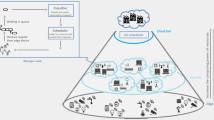Abstract
Recently, continuous growth in use of Internet of Things (IoT) produces huge amount of data during processing, which increases load on Cloud Computing network. Cloud computing does not support low latency for real-time applications. To overcome such drawbacks like low latency, lower response time, IoT-based application moves towards Fog Computing. Fog Computing along with Cloud Computing provides best solution for such IoT applications. Fog Computing enables user to process data near to end user. It supports low latency and low response time than Cloud environment. Fog Computing allows to schedule application tasks on various Fog nodes which are available in the network. Fog nodes have limited resources than Cloud Computing, and hence, scheduling tasks among Fog nodes becomes essential. In this paper, a scheduling algorithm, namely, Energy efficient task scheduling in Fog Computing based on Particle Swarm Optimization (EETSPSO), has been proposed. The proposed EETSPSO algorithm simulated in MATLAB. Proposed EETSPSO evaluated using evaluation parameters makespan, energy, and execution time. The simulated result of EETSPSO shows better result by minimizing the makespan time, execution time, and reducing the energy consumption as compared to Bee Life Algorithm (BLA) and Modified Particle Swarm Optimization (MPSO). The simulated experiment shows better performance of EETSPSO for makespan 6.39% and 4.71% compared to MPSO and BLA respectively. Simulation result of EETSPSO also shows 9.12% and 11.47% energy reduction when compared with MPSO and BLA. EETSPSO performed better than MPSO and BLA by 9.83% and 6.32%, respectively, for execution time comparison.





Similar content being viewed by others
Data Availability
As we have used a simulator, so data was generated based on the model we have proposed. We can provide that data and code if required. No pre-existing data was used for the analysis of this model.
References
Bansal S, Aggarwal M, Aggarwal H. Advancements and applications in fog computing. In: Security designs for the cloud, IoT, and social networking; 2019. p. 207–40.
Choudhary S, Kesswani N. Cluster-based intrusion detection method for internet of things. In: 2019 IEEE/ACS 16th international conference on computer systems and applications (AICCSA). London: IEEE; 2019, November. p. 1–8.
Puliafito C, Mingozzi E, Longo F, Puliafito A, Rana O. Fog computing for the internet of things: a survey. ACM Trans Internet Technol (TOIT). 2019;19(2):1–41.
Hu P, Dhelim S, Ning H, Qiu T. Survey on fog computing: architecture, key technologies, applications and open issues. J Netw Comp Appl. 2017;98:27–42.
Wang S, Zhang X, Zhang Y, Wang L, Yang J, Wang W. A survey on mobile edge networks: convergence of computing, caching and communications. IEEE Access. 2017;5:6757–79.
Kaur N, Kumar A, Kumar R. A systematic review on task scheduling in Fog computing: taxonomy, tools, challenges, and future directions. Concurr Comput Pract Exp. 2021;33(21):e6432.
Abdel-Basset M, Mohamed R, Chakrabortty RK, Ryan MJ. IEGA: an improved elitism-based genetic algorithm for task scheduling problem in fog computing. Int J Intell Syst. 2021;36(9):4592–631.
Kalantary S, Akbari Torkestani J, Shahidinejad A. Resource discovery in the Internet of Things integrated with fog computing using Markov learning model. J Supercomput. 2021;77(12):13806–27.
Gu K, Tang L, Jiang J, Jia W. Resource allocation scheme for community-based fog computing based on reputation mechanism. IEEE Trans Comput Soc Syst. 2020;7(5):1246–63.
Fadahunsi O, Maheswaran M. Locality sensitive request distribution for fog and cloud servers. SOCA. 2019;13(2):127–40.
Bhatia M, Sood SK, Kaur S. Quantumized approach of load scheduling in fog computing environment for IoT applications. Computing. 2020;102(5):1097–115.
Beraldi R, Canali C, Lancellotti R, Proietti Mattia G. Randomized load balancing under loosely correlated state information in fog computing. In: Proceedings of the 23rd international ACM conference on modeling, analysis and simulation of wireless and mobile systems; 2020, November. p. 123–7.
Singh A, Auluck N. Load balancing aware scheduling algorithms for fog networks. Softw Pract Exp. 2020;50(11):2012–30.
Memari P, Mohammadi SS, Jolai F, Tavakkoli-Moghaddam R. A latency-aware task scheduling algorithm for allocating virtual machines in a cost-effective and time-sensitive fog-cloud architecture. J Supercomput. 2022;78(1):93–122.
Zhou MT, Ren TF, Dai ZM, Feng XY. Task scheduling and resource balancing of fog computing in smart factory. Mobile Netw Appl. 2022;1–12.
Chuang YT, Hsiang CS. A popularity-aware and energy-efficient offloading mechanism in fog computing. J Supercomput. 2022;1–24.
Khoobkar MH, Dehghan Takht Fooladi M, Rezvani MH, Gilanian Sadeghi MM. Partial offloading with stable equilibrium in fog-cloud environments using replicator dynamics of evolutionary game theory. Clust Comput. 2022;25(2):1393–420.
Natesha BV, Guddeti RMR. Meta-heuristic based hybrid service placement strategies for two-level fog computing architecture. J Netw Syst Manag. 2022;30(3):1–23.
Gad AG. Particle swarm optimization algorithm and its applications: a systematic review. Arch Comput Methods Eng. 2022;2022:1–31.
Zhou Z, Chang J, Hu Z, Yu J, Li F. A modified PSO algorithm for task scheduling optimization in cloud computing. Concurr Comput Pract Exp. 2018;30(24):e4970.
Matrouk K, Alatoun K. Scheduling algorithms in fog computing: a survey. Int J Networked Distrib Comput. 2021;9(1):59–74.
Author information
Authors and Affiliations
Corresponding author
Ethics declarations
Conflict of Interest
On behalf of all authors, the corresponding author states that there is no conflict of interest.
Additional information
Publisher's Note
Springer Nature remains neutral with regard to jurisdictional claims in published maps and institutional affiliations.
This article is part of the topical collection “Enabling Innovative Computational Intelligence Technologies for IOT” guest edited by Omer Rana, Rajiv Misra, Alexander Pfeiffer, Luigi Troiano and Nishtha Kesswani.
Rights and permissions
Springer Nature or its licensor (e.g. a society or other partner) holds exclusive rights to this article under a publishing agreement with the author(s) or other rightsholder(s); author self-archiving of the accepted manuscript version of this article is solely governed by the terms of such publishing agreement and applicable law.
About this article
Cite this article
Vispute, S.D., Vashisht, P. Energy-Efficient Task Scheduling in Fog Computing Based on Particle Swarm Optimization. SN COMPUT. SCI. 4, 391 (2023). https://doi.org/10.1007/s42979-022-01639-3
Received:
Accepted:
Published:
DOI: https://doi.org/10.1007/s42979-022-01639-3




